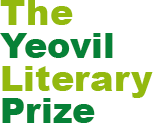For full details of the results, choose a category:


For full details of the results, choose a category:
FIRST PRIZE - Terri Armstrong
SECOND PRIZE - Phyllis Rudin
THIRD PRIZE - Mary Williams
FIRST PRIZE - Dan Powell
SECOND PRIZE - Leo Madigan
THIRD PRIZE - Geraldine Terry
FIRST PRIZE - Catherine Chanter
SECOND PRIZE - Laura Thompson
THIRD PRIZE - Catherine Chanter
The writing submitted to the 2010 Yeovil Literary Prize was of such a high standard, and the subjects covered so diverse, that judging was a pleasurable but difficult task.
We’re now in our seventh year and it seems to be bigger and better in both quantity and quality. The number of entries has certainly increased, both on-line and the time-honoured postal entry. After reading the synopsis and first three chapters of each novel our imagination was caught so we were left wanting to read on, to know more about the characters and how the plot would eventually end. We appreciated the wide-ranging genres and have been applauded for including children’s and young adult fiction in our criteria. One of our Highly Commended novels was written for young adults and it was most pleasing to find this challenging genre being submitted. We wish all the authors of the winning entries in each category every success in finding an agent, as being published is the ultimate goal.
This is truly an international writing competition with entries from many countries. Good writing can transport the reader immediately to a country by the use of language and eloquent description of locations. Our novel category winners this year have successfully placed their stories in Australia, Canada and England. Other writers wrote with a ‘voice’ that could be immediately recognised as belonging to a particular country. A sense of place as well as time are crucial to the success of a novel. Sharon Blackie, publisher of Two Ravens Press, judged this category and she commented on the winning novel…”The author cleverly develops a sense of crisis building, leading to a feeling of suspense, which makes you want to read on.”
Our short story judge, Francine Lee, who is very experienced in the art of short story writing, commented, “I can’t tell you how much I enjoyed reading the shortlist. The quality of writing was indeed excellent and it made for torture choosing the three prize winners.”
A wonderful selection of subjects were covered; all involved strong characters, sharp plotting and meaningful themes. Our winners chose what, on the surface, could have been mundane topics, then transformed them into beautifully written and memorable stories to which every reader could relate.
All the entries in the Yeovil Literary Prize are judged anonymously and this year we were in for a surprise. Our very different but equally intriguing and beautifully constructed first and third prize winning poems, were written by the same person. We had just under 400 entries in this category. We know she is a good writer because she also gained a Highly Commended in the short story category. All three winning poems covered topics with emotional undertones; each had a voice that spoke volumes in creating a sense of place and being; both of these elements are essential to grab and retain the attention of the reader. When we were able to relay to David Evans, our poetry category judge, that we had the same person winning with two poems he was pleasantly surprised, as the poems were so different. He praised us for using anonymous judging. All our poems were good, but these three winning entries were exceptional.
We’d love to hear any good news stories from people who have entered in previous years. We know how being given a Highly Commended spurred one entrant to pluck up the courage to send her novel off to an agent. Eighteen months later she was holding her book and glowing with pride. The Yeovil Literary Prize was the catalyst that initiated this success. Being Highly Commended puts your novels, short stories and poems up with the top eight submitted in each category, so every one of you are winners in our eyes.
We wholeheartedly thank our judges, Sharon Blackie, Francine Lee and David Evans for being such wonderful judges.
The 2011 Yeovil Literary Prize will open on 1st January 2011 and our three judges will be Daisy Goodwin, writer and television producer, judging the poetry; Mark Lucas of LAW Literary Agency, judging the short story category, and Katharine McMahon, who wrote Rose of Sebastopol and The Crimson Rooms, will judge our novels.
the Judging Team
| Terri Armstrong | Standing Water |
| Sharon Blackie comments (this is an extract): "A well structured beginning, with good short opening vignettes to establish setting, back story and character. The author cleverly develops a sense of crisis building, leading to a feeling of suspense, which makes you want to read on. The writing is very fluid." |
 Terri Armstrong Terri Armstrong Biography: Originally Australian (from a small rural community) I came to the UK over twenty years ago and survived by washing dishes, typing and doing factory night shifts. Eventually I took a Diploma in Women's Studies at the University of North London, before completing a BA in Politics and Sociology (First Class) at the University of East Anglia. I began to write regularly after this, and gained a Diploma in Creative Writing from the UEA. I've found the scope to develop characters and ideas that writing a novel offers both exciting and challenging. Also a challenge is finding sustained amounts of time to write, though I am lucky enough to work part-time (for a charity supporting ex-offenders in Norwich, where I live with my 15 year old son, husband and step-daughter). Standing Water is my first novel – I am currently seeking an agent/publisher. My second novel is in progress. |
| Phyllis Rudin | The CEO of Oz |
| Sharon Blackie comments (this is an extract): "Beautifully written, very fluent and witty. Good vivid description. Finding the balance between overdoing the wit, and being too clever is often a challenge. The characters were believable and the storytelling allowed the reader to engage with them." |
|
Biography: In my day job, I am a librarian at McGill University in Montreal, the history research specialist. You know how it is with librarians. They hang around the stacks for so long, they always end up with an itch to write. It's only for the past four years that I've been writing seriously, dividing my time between The CEO of Oz and short stories, but I've discovered that I prefer the long-term slog of the novel. My first published short story, Inside Scoop, is forthcoming in The Massachusetts Review. I am midway through my second novel, more committedly comic than CEO, also set in Montreal. |
| Mary Williams | Losing It |
| Sharon Blackie comments (this is an extract): "Losing It, A well written insight into the mind of the disturbed central character, with a fascinating theme and an ambitious programme of writing. The narrative builds early on giving the reader an idea of what has led Jane to this place and what is at stake for her” |
|
Biography: "MARY WILLIAMS (writing as Valentine Williams) is a writer and poet who gained a late MA in Creative Writing at Edge Hill and was then commissioned to write two self-help books for Sheldon (SPCK) . Trained in psychotherapy, she has worked in Mental Health and allied fields most of her life, having failed to keep order as a teacher and bored to tears by banking, her first two career choices. Published in many poetry anthologies and winner of several prizes last year, Mary keeps tabs on the Liverpool poets she met while on her MA, and helps run a writers' and poets' group in her hometown. When not at her computer or kitchen sink, she can be found on her allotment or in the local flea market. Married with four adult sons, she lives in Shropshire in an inconvenient cottage full of paintings by friends and family members with her art-therapist husband." |
| Kate Kelly | White Rock Red World |
| William McCormick | The Second Siege |
| Gerry Marron | Hungry Ghosts |
| Mary McCluskey | Collateral Damage |
| Chip Tolson | Requiem for Private Hughes |
| Colin Rogers | The Cycle of Death |
| Luke Bramley | The Kingdom Within |
| Tamsin Francis | Gin, Fleas and Chilblains |
| Sam Grosser | After The Twelfth |
| Emma Timpany | Under the Wave |
| Nigel Tordorf | The Woman Next Door |
| Adrian Casey | Gravity |
| Stella Rock | The Beekeeper |
| Dan Powell | Half Mown Lawn |
|
Biography : ' He was born in the Midlands in the early Seventies and spent nearly ten years teaching Secondary School English before becoming a stay at home Dad, to care for his young family. His stories have appeared or are forthcoming in the pages of Metazen, The View From Here, microhorror.com , The New Flesh, 100 Stories for Haiti , Elemental Horror and Chinese Whisperings: The Yang Book. He blogs at www.danpowellfiction.com ’ ' |
|
Judge, Francine Lee, says about “Half Mown Lawn” Beautifully crafted, never sentimental or maudlin, we follow Annie in the first few days after her husband’s sudden death as she adjusts to life without him. There is little dialogue but what there is adds to the restraint of the story. The author uses spare, crisp language to explore Annie’s stunned reaction as she goes shopping with her amended list and her ‘bags for life’. The deft description and attention to the smallest of details, such as the Ikea pencil she finds in her pocket, define the character and her life. The deeply satisfying ending stayed with me for a long time after reading. An everyday subject lifted out of the mundane by the sheer quality of the writing. |
| Leo Madigan | The Will of Quintus Kirkwood |
|
Biography : "I am an ex-merchant seaman, who has lived in Central Portugal for over twenty years. I have published a number of books, both fiction and non fiction in UK, USA and in Portugal. Nowadays I am trying to |
| Judge, Francine Lee, says about “The Will of Quintas Kirkwood” "Although Quintus Kirkwood is dead from the outset he is brought very much to life by the author in this quirky story. The death of the billionaire New Zealand businessman is announced, creating wild speculation as to who will be the beneficiaries. Will it be his avaricious and vulgar family or one of the many charities and concerns he favoured in his lifetime?" |
| Geraldine Terry | Villa In The Sun |
|
Biography : "After years of wasting her creativity on reports, presentations and emails in large retail companies Geraldine gave up full time work to spend more time on writing. She completed an MA in Creative Writing at Brunel and has just finished her first novel. She has had one other short story published in Mslexia but this is the first time she has won a prize. She is now alternating short story writing with planning her second novel. " |
|
Judge Francine Lee, says about “Villa In The Sun” "Ellie and Paul have rented a villa for the perfect summer escape. With them are their baby daughter and Paul’s son, Ben, who has been foisted on them by his errant mother. This is the story of crushed expectation and an idyll gone sour. Ellie attempts to bond with Ben who she finds sullen and unresponsive. She imagines him a changeling. Is he indeed a bad seed or simply a small troubled boy? Can we trust Ellie’s view of him? The description of her growing irritation, the heat and Paul’s inertia builds the tension of the story to the final breathtaking scene, highlighting the dichotomy in her behaviour toward the two children. ‘She knew she should feel sorry for the child’, but we know from her actions she doesn’t. Her maternal instinct does not extend to Ben. The ending reads like a silent scream." |
| Kate Kelly | Weedkiller |
| Catherine Chanter | The Conspiracy |
| Sarah Palmer | The Woman Who Couldn't Sleep |
| Sue Yockney | Happy Deathday |
| Andrew Campbell-Kearsey | Butterflies |
| Fabian Acker | Of Mice and Mistletoe |
| Jacqueline Winn | The Dangers of Swimming |
| Mary Davies | Sofija's Miracle |
| Anne Thomas | Lydia's Bonnet |
| Anne Wilks | Sunday Best Dress |
| Janet Lesley Smith | Unlucky for Some |
| Leo Madigan | The Naked Fishermen |
| Anne Smith | A Game of Cards |
| Catherine Chanter | The Foster Boy's Bedroom |
Biography : 'Catherine Chanter grew up in the West Country, studied English Literature at Oxford and initially worked as a lobbyist in the UK and in the USA. Disillusioned with the political process, she returned to the UK, re-trained and has since worked with children with significant emotional and behavioural difficulties in a wide range of settings . This work has inspired much of her writing. Catherine has written for Radio 4 and has had poetry and short stories published in a wide range of anthologies and journals, including “A Summary of Findings”, runner up for the 2009 Asham Award. Her first novella and collection of short stories entitled “Rooms of the Mind” will be published by Cinnamon Press in December, 2010. Catherine currently lives and works in Oxford. ' |
| David Evans, our poetry judge said this of The Foster Boy's Bedroom:- This powerful, technically unorthodox and disturbing poem begins by suggesting an urgent domestic practicality: ‘emptied the drawers emptied the chest of its drawers emptied/ the room of the chest unhung the rattling hangers ' Lower case, unusual spacing and a good eye for detail are used to enhance the sense of the fostered boy's bedroom being stripped bare. We are told that this is ‘so he can curl up in his at least he's safe place' but then we deduce that his bedroom has become tantamount to a prison: this from the grim fact that ‘she' (the fosterer) is unhappily ‘on the other side-/ the side with the handle' in her ‘at least i'm safe/ place.' In contrast to this grimness and deliberately fractured rhythm, some lyrical lines evoke the woman's generous imaginings when she offered her home and ‘thought sticks/ and stones could not hurt things shattered could be mended boys broken/ fixed.' Human failure and anguish are rendered with skill and without preachiness. |
| Laura Thompson | The Other side |
Biography : ' I was born in Northern Ireland in 1972 and live in County Antrim. I have two sons and look after them full-time. I have had a range of jobs including factory worker, linen worker, shop assistant and administrator. |
| David Evans, our poetry judge said this of The Other Side:- "As the title suggests, this amusing poem fancifully explores questions of social difference by referring to the method of numbering the opposite sides of a street. The residents in the even-numbered houses are respectable, pious, prosperous, judgmental and secretly snobbish. The ‘odds’ on the other side ‘falter and fumble and can’t ever fit in.’ They ‘shout and blaspheme, and mumble’ are irresponsible, ‘do odd jobs and hide from the rent man.’ They ‘have babies to burn, and more on the way’ but do ‘stick with each other’. The poet’s sure handling of metre and sparing but effective use of rhyme and half-rhyme carry the reader to the satisfyingly poignant, even menacing, final stanza. The poem is a reminder that wit and wisdom can cohabit and lightness of touch does not preclude depth of insight." |
| Catherine Chanter | Papua New Guinea 1959. Photograph of a Tribesman |
 Catherine Chanter: ' Catherine also won first prize with The Foster Boy's Bedroom. Catherine Chanter: ' Catherine also won first prize with The Foster Boy's Bedroom. |
| David Evans, our poetry judge said this of Papua New Guinea 1959, Photograph of a Tribesman:- "Choices for all three prizes were strongly contested and third place was no exception. I've chosen this intriguing poem – presumably based on a photograph - because it navigates the narrative tradition without seeming old-fashioned. The theme - of vanity and innocence exploited – is unfolded in vivid language. The photographer unwraps his camera and stands it ‘like a new born beast/ in front of us, unsteady on its legs and stiff.' His race is subtly disclosed: ‘Then he touched my son. Took his chin/in thin white fingers…' The technique is unobtrusively competent with the occasional rhyme and half-rhyme leading towards the concluding rhyming couplet and the victim's recognition of his own contribution to his exploitation. " |
| Pat Borthwick | In Praise of the Garden Centre Gift Shop |
| Anna O'Donoghue | Somerset Levels – the Summerlands |
| W F Lantry | Interlace |
| Noel Williams | A Clear Sky, Snowdrifts |
| Christian Ward | The Daily Special |
| Simon Jackson | Apostrophe |
| Wendy Holborrow | Protected |
| Alan Dunnett | Something Missing |
| Ray Miller | Bad Faith |
| Louise Wilford | Scenic |
| Phoebe Walker | Salam New Town |
| Phil Powley | Shadow Over The Garden |